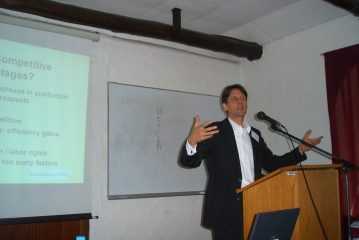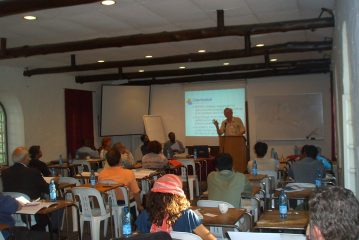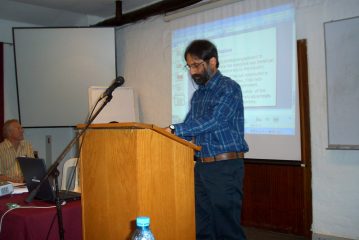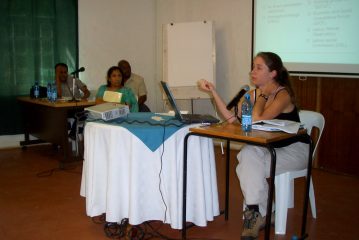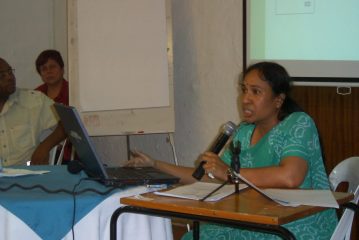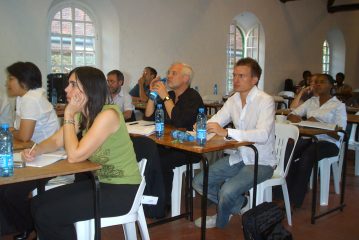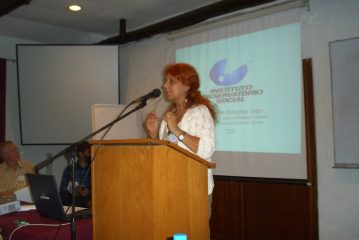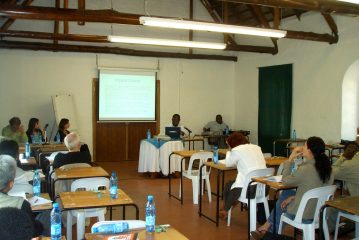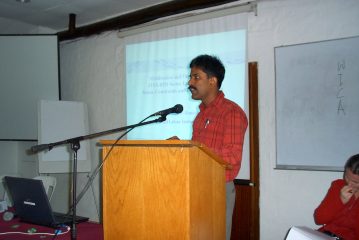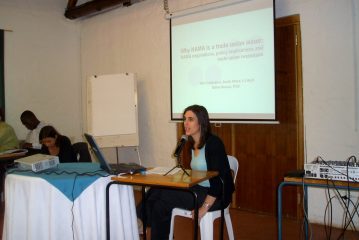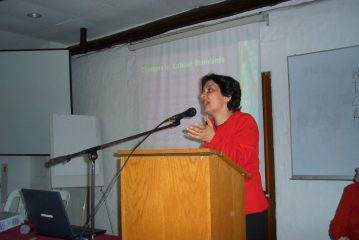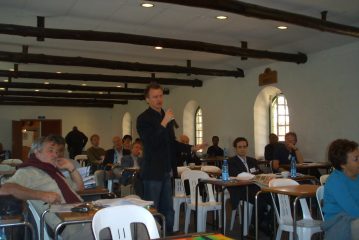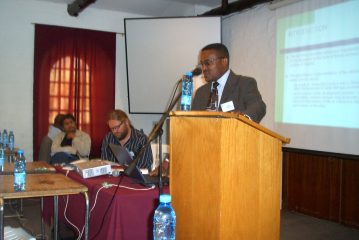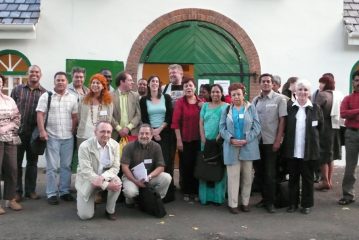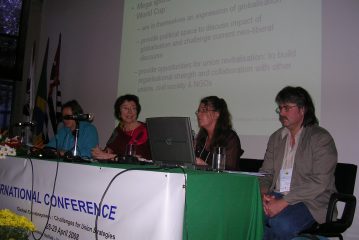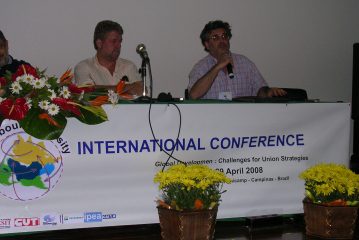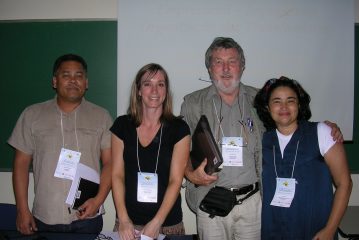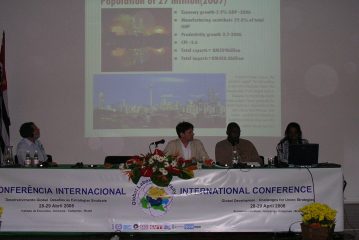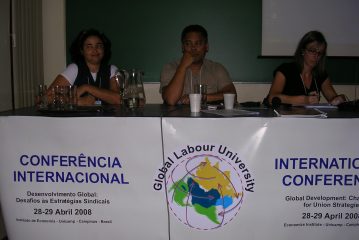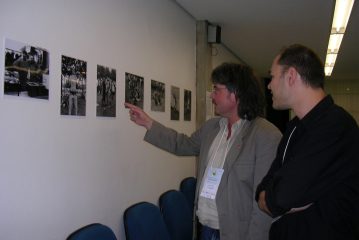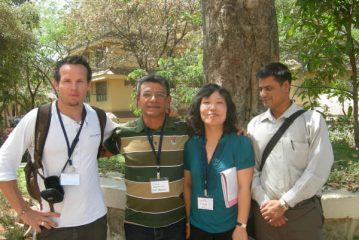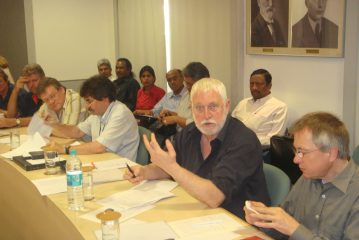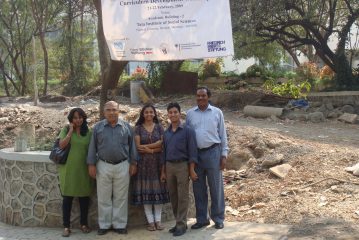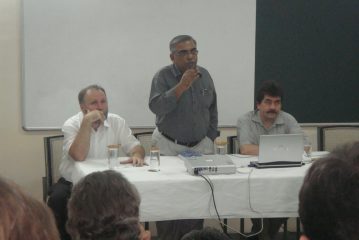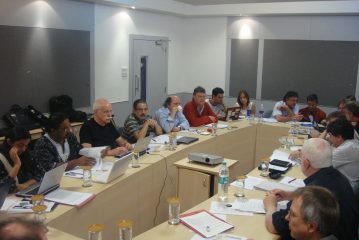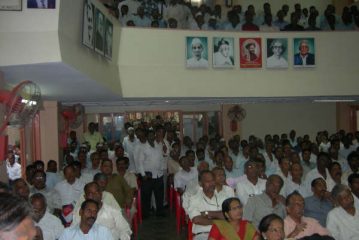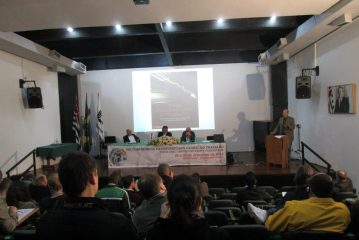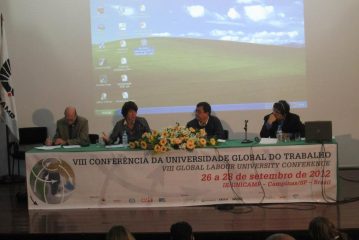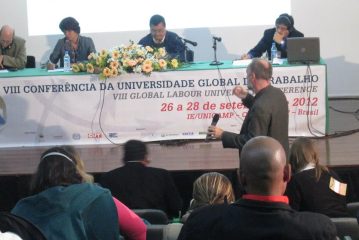III GLU CONFERENCE
Labour and the Challenges of Development
The overall theme is Labour and the Challenges of Development, which is oriented around two key questions:
1) Labour, growth and the ‘developmental state’ – what kind of state-society linkages are necessary to avoid ‘enclave’, ‘uneconomic’ growth and development?
2) Labour, development and trade – what role does trade play in undermining or enhancing inclusive development?
about the conference
Background:
Unions around the world operate in a complex and rapidly changing environment. In response to the industrial revolution of the 19th century organised labour fought for legislation and welfare provisions to make the ruthless dynamic of a ‘free’ market compatible with a democratic and inclusive society. Within many Northern industrialised countries, this struggle has been remarkably successful during the second half of the twentieth century, with many achieving near full employment and a substantial social wage. However, much of the Southern developing (or majority) world experienced low or at best ‘enclave’ development, where a few cosmopolitan elites enjoy the fruits of ‘development’, while the majority experience massive unemployment, informalised work, low wages and poor working conditions. For many, this experience of under-development is a direct result of colonialism and neo-colonialism, which arguably was a necessary condition for the development of the North.
At the beginning of the 21st century, the new wave of ‘neo-liberal’ globalisation has shifted jobs from the North to parts of the South. While on the one hand, this has boosted employment in parts of the South (especially Asia), it has threatened the ability of states to spread the benefits of economic development to all their citizens. In the North, it is eroding the regulatory capacity of the nation-state and the capacity of trade unions to defend social achievements. Most countries in the world now experience diminishing labour rights and welfare provisions, informalisation of employment relations and growing inequality and poverty. Indeed, on a global scale, the rich have become richer and the poor poorer.
Event Facts
III GLU CONFERENCE
IV GLU CONFERENCE
GLOBAL DEVELOPMENT: CHALLENGES FOR UNION STRATEGIES
At the GLU annual workshop in 2008 trade unionists and scholars are invited to present papers and discuss the challenges for organised labour as outlined in the two main topics:
• Union strategies in the new international division of labour
• Towards socially and environmentally sustainable development: strategies for labour
about the conference
Background:
The world has undergone profound changes in the last quarter of a century
• changes in international trade and investment regimes;
• changes in the institutions that regulate the capital accumulation and income distribution at national levels;
• redefinitions of the boundaries between public and private space in the economy;
• growing influence of finance overproduction and service provision as sources of wealth.
As a consequence of those changes, economic growth has been accompanied by increasing inequality and insecurity for vast numbers of people both in rich and poor countries. At the same time, imbalances between national economies and among regions within national economies have become more acute. Current trade and investment regimes backed by industrialised countries seem to severely restrain the ability of national policies that could help developing countries to “climb the tree” towards better economic and social conditions. To complete the picture, current growth patterns seem to result in unsustainable demands over natural resources. Not surprisingly, there is a growing feeling in developing countries about the urgency of a new development agenda. Unions must face the challenge of defining strategies to help build and advance such an agenda.
Event Facts
IV GLU CONFERENCE
Download Info Materials
Read more about the conference and call for papers
Download registration form
Download the full conference programme
Download the conference invitation here
CONFERENCE PAPERS
by Cirila Quintero Ramírez
by Pat Horn
by Thulani Guliwe
by Silvia Eloisa Fernández Venegas & Martín Pascual Arias
Ruppert Karadag
by Wilfried Schwetz & Donna McGuire
by Thulani Guliwe
by Jana Silverman
by Nilton Freitas
by Edward Webster & Christine Bischoff
by Janet Munakamwe
by Alexandre de Freitas Barbosa
by Luciana Itikawa & João Paulo Cândia Veiga
by Lílian Arruda & Francine Modesto
by Enrique H. Sosa
by José Drummond
by Kjeld Jakobsen & Daniela Sampaio de Carvalho
by Rajeswari Raman
by Michèle Descolonges
by Steve Davies
by Juçara Portilho Lins
by Devan Pillay
by Michael Fichter & Jörg Sydow
V GLU CONFERENCE
Financialisation of Capital – Deterioration of Working Conditions
The 2008 ILO Declaration on Social Justice for a Fair Globalisation urges a shift in global policies to achieve Social Justice and Decent Work. The Declaration calls to examine and consider all international economic and financial policies in the light of the fundamental objective of social justice. At the GLU annual conference in 2009 trade unionists and scholars are invited to present papers and discuss the challenges for organised labour.
about the conference
Background:
The conference will focus on two main topics:
1) Global capital mobility and its impact on wages and employment conditions.
The desire of enterprises to maximise profit has not changed over time. Nevertheless, enterprise behaviour has changed dramatically over the last decades. Aggressive short term profit maximization by financial investors is a key feature of this new environment. Despite some impressive campaigns and organizing successes trade unions were not able to defend successfully workers’ interests against these new structural forces. Informal and precarious employment is on the rise, concessions of workers in regular employment are widespread and inequality is growing. Hopes, voluntary corporate social responsibility could make a fundamental difference, evaporated under the heat of global competition. Increasingly the debate refocuses on the role of states and (global) hard law to reign in global capital markets.
2) Extending rights and collective bargaining to workers in precarious and informal employment. Global companies and the global financial industry have been successfully influencing decision making on a national and international level to shape legislation and global rules in favour of individual and common business interests. The demand for immediate high returns from financial investors and the inability to raise prices in a competitive environment do result in massive pressure on wages and working conditions. Millions of workers are not protected by law or collective agreements. They are forced to accept precarious or informal employment.
Civil society groups including trade unions are becoming more global to defend their interest as workers and citizens against the highest rates of return on private investment as the guiding principle of global policymaking. This requires innovative approaches to organizing and changes in institutions and regulations to readjust the balance of power between private business interest and society at large in particular as transparent and accountable democratic decision making has in many cases been substituted by lobbyism and supranational bodies that lack democratic control and legitimacy.
Event Facts
V GLU CONFERENCE
Download Info Materials
Download call for papers
Learn more about the conference theme
Download the full conference programme
CONFERENCE PAPERS
by Camila Gripp
by Li Deqi & Yang Hanping
by Engelbert Stockhammer
by Ângela Tepassê, Francine Modesto dos Santos, Lílian Arruda & Vicente Gomes Macedo Neto
by Dithhi Bhattacharya
by Jennifer Cohen
by H. Lotta Takala-Greenish
by Christoph Scherrer
by Aelim Yun
by Trevor Evans
by Narumol Nirathron
by Seeraj Mohamed
by Sean Sweeney
by Bino Paul
by Helen Schwenken
by José Ricardo B. Gonçalves, José Dari Krei and Maria Alejandra C. Madi
by Heather L. Taylor
by Hansjörg Herr
by Alexandre de Freitas Barbosa
by Paliani Chinguwo
by Daniel Hawkins
by Özlem Onaran
by Debdulal Saha
by Babu P. Remesh
by Michael Fichter
by Aishwarya Singh & Vinay Tyagi
by Andranik Tangian
by Rahmat Omar
by Andrew Watt
by Kóláwolé Emmanuel Omomowò
by Julie Froud, Sukh Johal, Adam Leaver, Karel Williams
by Premilla D’Cruz & Ernesto Noronha
by David Bensman & Xiong Jun
CONTACT US
Conference Director:
Dr. Sharit K. Bhowmik
Professor and Dean
School of Management and Labour Studies
Tata Institute of Social Sciences
Tel: +91-22-2552 5800
Conference Coordinators:
Ms. Indira Gartenberg
Mr. Debdulal Saha
Mobile No.: +91-98194 61819
Conference Secretariat:
School of Management and Labour Studies
Tata Institute of Social Sciences
V.N. Purav Marg, Deonar
Mumbai-400 088, India
Website: www.tiss.edu
VI GLU CONFERENCE
LABOUR AND THE GLOBAL CRISIS: SHARING THE BURDEN (!) SHAPING THE FUTURE (?)
Organised labour has mainly been consulted by governments on how to share the pain from the financial crisis in 2007-2008, but not on how to shape the future. This raises the question of whether the crisis will accelerate the decline of organised labour and the deterioration of the welfare state or whether it can be made into an opportunity for labour to regain the policy initiative.
Against this background, the 6th GLU Conference will focus on the analysis, short-term stabilisation and long-term options.
about the conference
Background
By 2008 the financial crisis that broke out in the U.S. in 2007 had developed into a full-scale global, systemic financial crisis which ignited a deep crisis in the real economy around the world.
Industrialised countries like the USA and the members of the European Union as well as developing countries around the world have all been affected by the crisis. Countries which had deregulated their financial markets to a great extent – like the USA –, countries dependent on exports – like Germany – and economies with high current account deficits and high foreign debt – like the Baltic States –suffered the most. Worldwide fiscal stimulus packages together with expansionary monetary policy and bailouts of financial institutions were able to limit the rapid contraction of production in most countries and stabilise the situation. However, there seems to be no source which could re-establish the (in many cases already low) growth rates which existed before the crisis. A scenario of long-term stagnating GDP growth in developed countries and insufficient growth in developing countries appears very likely. At all events, more and more countries are turning to severe austerity programs with wages, social security and public service cut to pay for the crisis. After looting the state for the sake of the financial system some countries are now dismantling the welfare state as we know it.
Labour markets have been hit fundamentally by the crisis. Unemployment rates increased sharply all over the world and are set to continue rising in the coming years. If the world economy or a significant number of countries fall into long-term stagnation, then unemployment and the associated social consequences, such as poverty, will become an increasing problem. During the last few decades, labour markets have been deregulated in the country after country and precarious working conditions have become increasingly common. One of the dangers that this could lead to is a deflation triggered by wage cuts, a development that could push the world economy into a constellation comparable to the 1930s. Standard labour market instruments can help to mitigate the crisis but are on their own insufficient to create adequate employment.
Financial markets are still not regulated. Despite the deep economic crisis so far widespread anger among people has not translated into major policy shifts. After the near breakdown of the financial system in 2007 and 2008, the casino opened again. Bubbles in the stock market, the real estate market, the markets for natural resources and food or foreign exchange markets are likely as long as no fundamental changes are implemented. Furthermore, such bubbles are no longer likely to lead to short-term booms in the real economy.
Organised labour has mainly been consulted by governments on how to share the pain, but not on how to shape the future. This raises the question of whether the crisis will accelerate the decline of organised labour and the deterioration of the welfare state or whether it can be made into an opportunity for labour to regain the policy initiative. Given these perspectives the following topics will be discussed at the conference:
- Analyses of the crisis and short-term options
- Employment Developments and Labour Market Regulations after the Crisis
- Changes in the global economy and power structures and global governance reforms
- The financial system, distribution and growth
- Social safety nets and the public sector
- Financial systems, corporate governance and multinational companies
- Looking beyond the horizon – are there fundamental options?
Event Facts
VI GLU CONFERENCE
Download Info Materials
Download call for papers
Download the conference reader
Download the registration form here
Download the full conference programme
Download the conference flyer
More information about the presentation timetable
CONFERENCE PAPERS
by Pragya Khanna
by Thorsten Schulten
by Saumyajit Bhattacharya
by D. P. Singh
by Chandra D. Bhatta
by David Hall
by Özlem Onaran
by Hansjörg Herr
by Maya Bhullar
by Trevor Evans, Eckhard Hein, Hansjörg Herr, Martin Kronauer & Birgit Mahnkopf
by Laura Horn
by Gaurang R. Sahay
by Trevor Evans
by Paulo Baltar, José Dari Krein & Eugenia Troncoso Leone
by Licio da Costa Raimundo & Paulo Sérgio Fracalanza
by Thiago Marques Mandarino
by Melisa R. Serrano & Edlira Xhafa
by André L. M. Martins & Raquel O. Lindôso
by Isabelle Schömann
by Janine Leschke and Andrew Watt
by Neetha N.
by David Bensman
by Conor Cradden
by Jason Russell
by Bill Rosenberg
by Chris Tilly
by Lin Yanling & Ju Wenhui
by Sarbeswara Sahoo
by Devan Pillay
by Mark Thomas
by Debdulal Saha
by Jan Cremers
by José Ricardo Barbosa Gonçalves & Maria Alejandra Caporale Madi
by Bill Dunn
by Yasemin Özgün & Özgür Müftüoğlu
by Hepzibah Muñoz Martinez
by Martin Upchurch & Darko Marinković
by Engelbert Stockhammer
by Marcelo Weishaupt Proni
VII GLU CONFERENCE
The politics of labour and development
The Global Labour University will hold an International Workshop at the University of Witwatersrand (WITS), in Johannesburg, South Africa from 28-30 September 2011 to discuss the different dimensions of an labour agenda for change.
about the conference
Background:
The global economic crisis has had a particularly hard‐hitting impact on working people, their families and communities throughout the world. What is more, they also face an environmental crisis that is closely linked to the economic crisis. Together, these crises have intensified the dispossession of the commons (including both local resources and public goods such as health and education), the informalisation of labour, unemployment, national and global social inequality, and the “slummification” of cities. Declining biodiversity, climate change and pollution are evidence of the impact of the crisis on the planet itself. Environmental degradation threatens viable livelihoods and endangers public health. Meanwhile, the market imperatives get defining power over daily life, business interests tighten their stranglehold on the state logic and power is transferred to supranational institutions with limited democratic accountability, simultaneously narrowing electoral choices, and increasing restrictions on protest.
Labour, as a key social force of the excluded majority, has a crucial role to play in countering the destructive logic of capitalism. The politics of labour is about altering the balance of power away from the capital and unelected bureaucracies toward labour and broader society. The politics of labour is also about overcoming the multiple relations of power and oppression, including the economic, political, gender, ethnic and cultural, that contribute to and reproduce the power of the few and the subordination of the many. This has the following dimensions:
- workplace and collective bargaining issues,
- the potential for broader policy alliances,
- new forms of power and leverage,
- alternatives to the current globalization regime
Event Facts
VII GLU CONFERENCE
Download Info Materials
Download the call for papers
Download conference reader
Download the full conference programme
CONFERENCE PAPERS
by Alexei Izyumov and John Vahaly
by Babalwa Magoqwana
by Carol Jess
by Katherine Joynt and Edward Webster
Elaine Sio-ieng Hui, Chris King-chi Chan
by Ercüment Çelik
by Sue Ledwith, Akua Britwum / GLU Alumni Gender and Trade Unions Research Group
by Jacklyn Cock
by Jana Silverman
by Michelle Taal
by Hansjörg Herr and Milka Kazandziska
by Ognian N. Hishow
by Rudi Dicks and Stephanie Brockerhoff
by Ruy Braga
by Sönke Rabisch
by Umesh Upadhyaya
by Pragya Khanna
by Asanda Benya
by Bruno Dobrusin
by Devan Pillay
by Donna McGuire
by Ely Melchior Fair
Franco Barchiesi
by Claire Hobden and Frank Hoffer
by James Lazou and Alexandre Gori Maia
by Markus Helfen & Michael Fichter
by Michelle Williams
by Muttaqa Yushau
by Mwansa Kamukwamba
by Paul Stewart
by Sarbeswara Sahoo
by Stephanie Allais
by Verna Dinah Q. Viajar
VIII GLU CONFERENCE
Sustainable growth, development and labour
The Global Labour University will hold an International Workshop at the University of Campinas (UNICAMP), in Brazil from 26-28 September 2012. The conference will focus on the theme "Sustainable growth, development and labour: progressive responses at local, national and global level".
about the conference
Background:
The 8th GLU Conference will focus on the analysis of development processes, policies and concrete experiences that shed light on possible global, national and local strategies to overcome neoliberal orthodoxy in theory and practice, creating the conditions for inclusive development that is based on a stronger role for workers organization, industrial democracy, and a democratically accountable government that actively participates in economic activities and regulates the economy.
Thus, the Conference will address three sets of questions:
- National Progressive Policies
- International Policies and Regulation
- Generation and Dissemination of Progressive Public Policies
Event Facts
VIII GLU CONFERENCE
Download Info Materials
Download the call for papers
Download the full conference programme
IX GLU CONFERENCE
Inequality within and among Nations: Causes, Effects, and Responses
The conference is organised in conjunction with the World Congress of the International Trade Union Confederation (18-23 May 2014). It aims to promote debate between academic scholars, trade unionists and civil society activists and leaders.
about the conference
Background:
Increasing economic inequality is one of the key features of the radical globalisation project that emerged in the 1970s, generating levels of inequality incompatible with social inclusion, equal opportunities and fairness. In a situation characterised by a severe financial and economic crisis, rising unemployment and reduced social expenditure are deepening the social divide in many societies. The Great Recession across the global north in 2009, followed by a very weak recovery (and in some cases a double-dip), has hit the most disadvantaged social groups hardest. At the global level, GDP growth has slowed down.
Under these circumstances, opportunities for individual and social development are under threat, social cohesion is eroding, and the quality of democracy is deteriorating. Under the pressure of international institutions and national elites, governments are executing austerity policies despite public protest and the growing disillusionment of the populations with their political representatives and democracy.
Against this backdrop, the 2014 conference of the GLU focuses on the causes and effects of increases in economic inequality? and what can be done to prevent and reverse them. The conference is organised in conjunction with the World Congress of the International Trade Union Confederation (18-23 May 2014). It aims to promote debate between academic scholars, trade unionists and civil society activists and leaders.
Event Facts
IX GLU CONFERENCE
Download Info Materials
Download call for papers
Download the registration form here
Read the opening speech by Frank Hoffer
Practical information for participants
Download the conference programme in English
Download the conference programme in Spanish
Download the conference reader
CONFERENCE PAPERS
by Uma Rani, Patrick Belser, Martin Oelz & Setareh Ranjbar
by Dirk H. Ehnts
by Aelim Yun
by Madelaine Moore
by Sue Ledwith & Janet Munakamwe
by Natália Cindra & Steven Toff
by Daniel Detzer
by Alyssa Schneebaum, Bernhard Rumplmaier, Wilfried
A ltzinger
by Todor Kalamatiev & Aleksandar Ristovsk
by Bruno Dobrusi
by Christian Bergmann & Mine Tafolar
by Thomas Obst
by Ran Cheng
by Conor Cradden & Jean‐Christophe Graz
by Jörg Nowak & Alexander Gallas
by Paulo Sérgio Fracalanza & Rosana Icassatti Corazza
by Neil Coleman
by Lena Lavinas
by Ana Tércia Sanches & Juçara Portilho Lins
by Devan Pillay
by Laura Moisá
by Eckhard Hein
by Sigrid Betzelt
by Simon Deakin, Jonas Malmberg & Prabirjit Sarkar
by Lauro Mattei
by Serdal Bahçe & Ahmet Haşim Köse
by Naser Abdelkarim
by José Pacheco-Jiménez
by Adriana Nunes Ferreira, Ana Rosa Ribeiro de Mendonça
& Simone Deos
by Mark Anner & Jakir Hossain
by Ely Fair
X GLU CONFERENCE
Sharing the Gains – Containing Corporate Power
This conference seeks to explore causes for the unequal distribution of wealth along global value chains in recent decades and analyse mechanisms to contain corporate power and ensure that the vast wealth generated by corporate-led globalization can be more equitably distributed. We encourage the submission of papers that analyse the dynamics of growth of MNCs and their global value chains, and papers that explore state, international, and cross-border labour approaches to ensure more equitable and sustainable growth.
about the conference
Background:
The theme of the conference is the possibilities of national and international regulations, trade union campaigns and broader civil society mobilisation, strategic research and transparency to limit the power of Multinational Corporations (MNCs) and their control over Global Value Chains (GVCs). MNC-coordinated global value chains account for 80 per cent of global trade, and the income from trade flows within GVCs has doubled over the last 15 years. Yet, this vast corporate income is not fairly shared with workers who produce the wealth.
This conference seeks to explore causes for the unequal distribution of wealth along global value chains in recent decades and analyse mechanisms to contain corporate power and ensure that the vast wealth generated by corporate-led globalization can be more equitably distributed. We encourage the submission of papers that analyse the dynamics of growth of MNCs and their global value chains, and papers that explore state, international, and cross-border labour approaches to ensure more equitable and sustainable growth.
The following seven tracks will examine the overall conference theme.
1. MNCs, Trade Agreements, and Workers? Rights
2. The Role of the State: Regulating Corporations
3. Strategic Corporate Research and Campaigns
4. Human Rights, Labour Protection and Regulation, and Corporate Liability
5. Precarious Work: Organizing the Bottom of the Supply Chain
6. Wages, Bargaining, and Binding Agreements with MNCs
7. Development, Sustainability and Resistance
The conference is hosted by Penn State University and the AFL-CIO. It aims to promote debate between academic scholars, trade unionists and civil society activists and leaders.
Event Facts
X GLU CONFERENCE
Download Info Materials
Download the call for papers
Practical information for participants
Download the full conference programme
Visit the link to read the keynote speech by Richard Trumka (President of AFL‐CIO)
XI GLU CONFERENCE
The Just Transition and the Role of Labour: Our Ecological, Social, and Economic Future
Labour, as a key social force of the excluded majority, has a crucial role to play in countering these destructive logics, yet we also find labour playing a more ambiguous role, for example protecting the position of "insider" sectors of the working class, colluding with governing parties or corporations, or participating in corrupt practices. This conference is designed to explore both progressive labour experiences as well as these more ambiguous or contrary activities.
about the conference
Background:
The dynamics of the current global economic and political (dis)order have had devastating impacts on the environment and working people, their families and communities throughout the world. These dynamics have resulted in the informalisation of labour, unemployment, and social inequality at the national and global levels. The "slummification" of cities and commodification of public goods and public services as well as common goods like land, water and public space has intensified. Declining biodiversity, climate change and pollution are evidence of the impact of the crisis on the planet itself. Environmental degradation threatens viable livelihoods and endangers public health. Meanwhile, market imperatives get defining power over daily life, business interests tighten their stranglehold on the state logic, and power is transferred to supranational institutions with limited democratic accountability, simultaneously narrowing electoral choices, and placing increasing restrictions on protest.
Labour, as a key social force of the excluded majority, has a crucial role to play in countering these destructive logics, yet we also find labour playing a more ambiguous role, for example protecting the position of insider sectors of the working class, colluding with governing parties or corporation, or participating in corrupt practices. This conference is designed to explore both progressive labour experiences as well as these more ambiguous or contrary activities. To what extent does the politics of labour alter or reinforce the balance of power away from the capital and unelected bureaucracies toward labour and broader society? To what extent does labour overcome the multiple relations of power and oppression, including the economic, political gender, ethnic and cultural, and to what extent does labour contribute to and reproduce the power of the few and the subordination of the many?
In light of these experiences, do we need to rethink the analytical category 'trade union' and the assumptions that we attached to this? These questions have the following dimensions:
1. The workplace
2. Employment
3. New forms of power or leverage
4. Progressive policies
5. Political parties, alliances and trade union organisations, and political power
6. Governing the economy
7. Alternative forms of production, consumption and redistribution
8. Combating the decent work deficit in agricultural production systems
Event Facts
XI GLU CONFERENCE
Download Info Materials
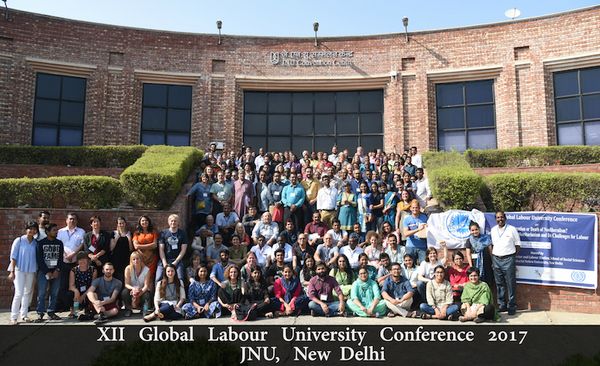
XII GLU CONFERENCE
Reincarnation or Death of Neoliberalism?
Labour faces the enormous challenge of simultaneously responding to the current globalization regime marked by growing inequality, continuing environmental degradation, global capital mobility, exploitative global supply chains, persistent high levels of informal employment, and growing precariousness through rapid digitalization. At the same time, labour must now respond to the rise of a national-authoritarian, anti-globalization wave.
about the conference
Background:
For three decades the rise of globalization commanded wide support as is necessary, desirable and, in any case, inevitable. Government after government, including those led by social democratic or socialist parties, accepted the imperatives of free capital markets, free trade, global production networks and flexible labour markets. The financial crises of 2008 shook the intellectual dominance, but not the institutional architecture of neoliberalism. Indeed, a new wave of structural adjustment and austerity was imposed on countries that had lost competitiveness. On the other hand, critical voices in the political mainstream became more frequent. Within the IMF, OECD and World Bank inequality, as well as volatile and under-regulated financial markets, were admitted to be problematic. Piketty's Capital in the Twenty-First Century became a bestseller. The confidence in the rationality of financial markets was shattered.
However, the apparent failures of the current globalization regime are most successfully exploited by nationalistic-authoritarian movements promising greater prosperity and fairness within nations by taking a more aggressive stance towards others. Movements mobilizing against unfair competition from other countries or foreign migrants command considerable working-class support. Wide-ranging, radical and often incomprehensive and demagogic policies deliver a unifying and mobilizing message by taking recourse to traditional values in a rather aggressive and exclusive fashion. Affirmative action for disadvantaged social groups or castes, gender equality, ethnic or religious minorities, government regulation, political correctness, migrants, or cultural liberalism, in general, are cultivated as favourite hate objectives of the disgruntled and successfully blended with promises to make the nation great again.
Today, it is unclear how the interests of global capital and the rise of authoritarian but popular leaders might reconcile and what that will imply for workers? rights, equity, liberal democracy, cultural diversity and respect for minorities. Will it by and large result in usual neoliberalism complimented with different rhetoric and some symbolic but marginal policy changes, or are there more far-reaching systemic changes in the making? Assuming that whatever happens will be just another reincarnation of old neo-liberalism carries the risk to underestimate the implications of the emerging new configurations.
Event Facts
XII GLU CONFERENCE
Download Info Materials
Download the call for papers
Download the list of hotels
Download the full conference programme
Practical information: Maps from International Airport of Delhi to Guesthouses
CONTACT US
For more information please contact:
For emergency please contact:
Amit Kumar: +91-750 333 4582
Chandan Sharma: +91-901 326 8414
Gurpreet Singh: +91-882 635 3310
